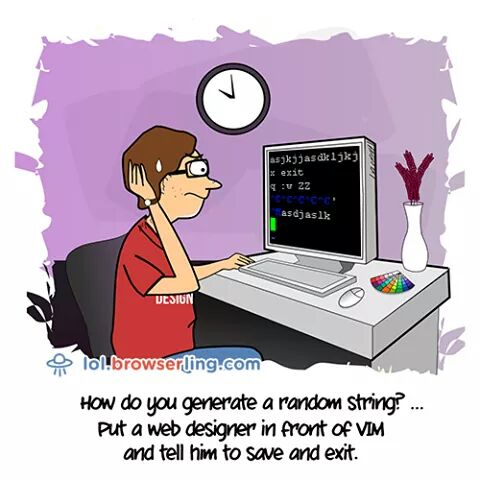Ranter
Join devRant
Do all the things like
++ or -- rants, post your own rants, comment on others' rants and build your customized dev avatar
Sign Up
Pipeless API

From the creators of devRant, Pipeless lets you power real-time personalized recommendations and activity feeds using a simple API
Learn More
Comments
-
It is. The bootcamps center around it, because it's more forgiving than backend. Services require more accuracy, rigor; if your UI tries to buy something as the wrong user, the service has got you. Then the companies try to use front end dev platforms and devs as backend dev..
-
 theuser46456y@SortOfTested Well yes obviously in terms accuracy, but that's not my job. My job is to present information from a database for the end-users and I will (hopegully) do it better than any backend dev, just as a backend dev will make a way more robust backend than I ever will. I will most likely do some light logic like grouping and sorting, but mostly design implementation. Am I still the lowest common denominator or are we simply working in different fields?
theuser46456y@SortOfTested Well yes obviously in terms accuracy, but that's not my job. My job is to present information from a database for the end-users and I will (hopegully) do it better than any backend dev, just as a backend dev will make a way more robust backend than I ever will. I will most likely do some light logic like grouping and sorting, but mostly design implementation. Am I still the lowest common denominator or are we simply working in different fields? -
@theuser
You might not be, but that doesn't change the fact that companies don't pay up for front end, and they have lower skills thresholds, so you get a diminished range of talent. Stereotyping is a real professional risk.
Imagine you're an exceptional SharePoint developer with a strong CS background and exceptional ability. People will still lump you in with the vast majority of that type of developer. For better or worse you don't base rules on exceptions. -
@rutee07 *spanking you hard'n'mean with a parallel port cable*
@theuser Because most frontend devs don't know shit about their tech, can't even write valid HTML, let alone know what the tags are for, accessibility is alien to them, and there's just no other dev domain where gross incompetence is the norm and not the exception.
Even popular frameworks like Bootstrap, Bulma, and Tailwind are expression of deep misunderstanding what CSS is even for, still developing like in the dark ages of HTML 3 back in the 90s.
It's just hopeless. They cobble some shit together and call it a day. And then they're bored, but instead of improving, they invent whole ecosystems full of shit like NPM. -
 theuser46456y@SortOfTested Is the economic part US-specific perhaps? Where I work, everyone is paid according to public union rates (everyone is titled software engineers). If I was paid less than a backend dev, then I might've considered backend work instead, but for the time being I much prefer design implementation and talking to users and designers.
theuser46456y@SortOfTested Is the economic part US-specific perhaps? Where I work, everyone is paid according to public union rates (everyone is titled software engineers). If I was paid less than a backend dev, then I might've considered backend work instead, but for the time being I much prefer design implementation and talking to users and designers. -
@theuser
Probably. That said we're also 350M humans and the objective center of technical resourcing demand. We have tech job headcount exceeding Norway's population, and most of the largest software firms are based here. Most of the staffing trends and strategies start here.
Are they good? Absolutely not, but they exist. The average front end dev in the US can expect to make 70% what a skilled backend dev makes. India follows suit, because jobs in the US set the top end of their pay scales. -
Your current job may pay the same for front and back. But the next promotion may favour back end and you end up missing it.
Also if the economy tank and its layoff time then the front end are in front of the line as they can easy be replaced.
On the other hand no company would lay off the back end guys that have a deep understanding of how all the strings tie together that keep the servers running.
Then again you got front end sorted, so go hard in back end and now your full stack. Full stack gets promoted to keep an eye on both front and back -
 theuser46456y@CorneliusA Well, the Norway market is especially missing a lot of frontend people. That also goes for developers in general, which means all consultants are encouraged to go fullstack for more selling points. For a new project, they will compose a bunch of fullstackers. Some of them are very good, but they are typically seniors and far few between. The rest may not being able to effectively handle all requirements of the project unless they are real superhumans, which in turn might delay the project and more money needs to exchange hands.
theuser46456y@CorneliusA Well, the Norway market is especially missing a lot of frontend people. That also goes for developers in general, which means all consultants are encouraged to go fullstack for more selling points. For a new project, they will compose a bunch of fullstackers. Some of them are very good, but they are typically seniors and far few between. The rest may not being able to effectively handle all requirements of the project unless they are real superhumans, which in turn might delay the project and more money needs to exchange hands.
I might do as you say and go backend at some point, I would no doubt get tired of frontend at some point like everything else in life. Also, if I go backend, I may not be a shitty programmer anymore according to logic.
Related Rants

 Front end developers
Front end developers The real random generators!
The real random generators!
I have a question, but first some background. When I got my first job, it wasn't clear cut what I would do, but I ended up doing frontend. I really liked doing frontend, so I continued doing so and I still do to this day. I even work alongside designers in a design studio, so I feel very much like a frontend developer.
Obviously, the term "frontend" these days implies someone, in some ways, writing a web, mobile or desktop app using javascript. For me, frontend is also about stuff like accessibility, design, code delivery, and understanding the end-users and the designers that may have prototyped something for you.
I have not been active in any other dev communities than this place, but it seems to me like a frontend developer is pretty much the lowest common denominator ( I guess in terms of skills). If I am right, I do not know why, which is why I'm hoping someone could explain.
question
lowest common denominator
frontend